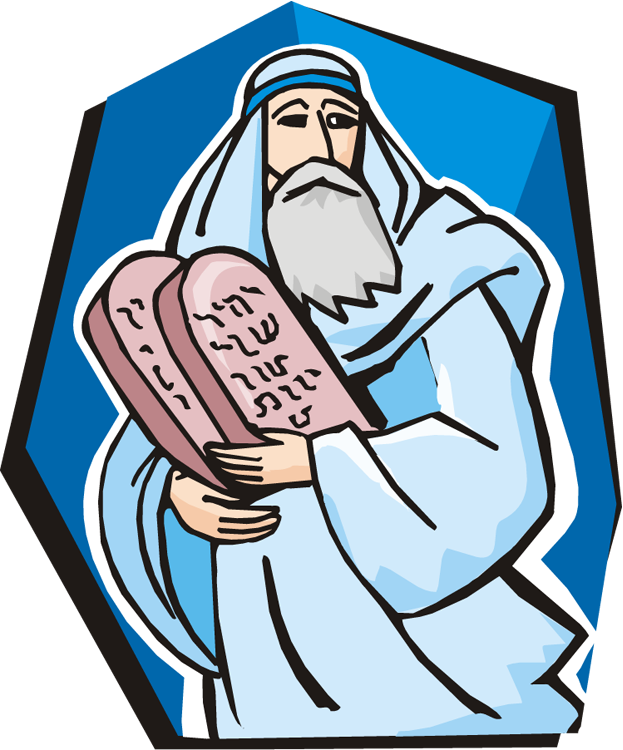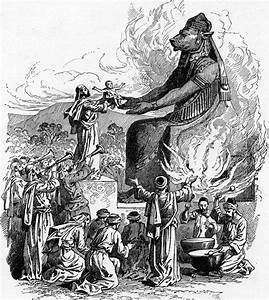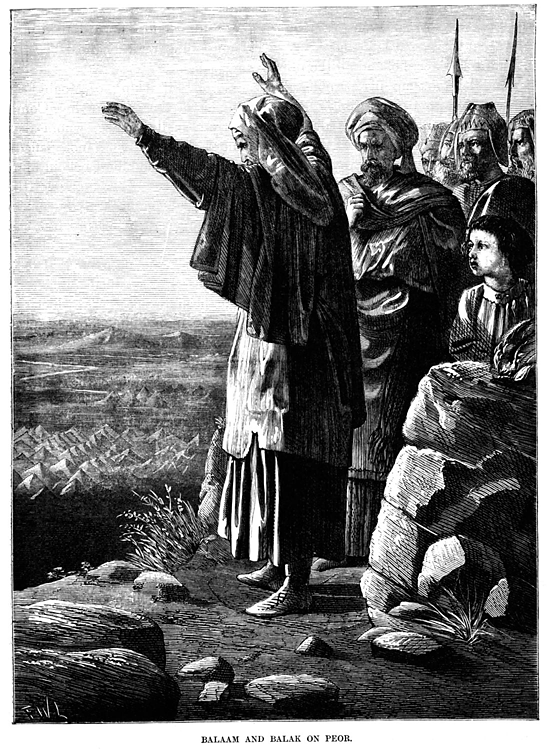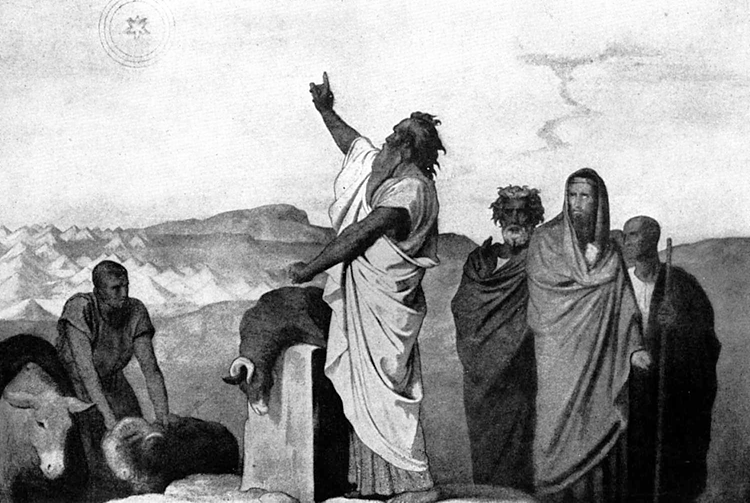Tag Archives: False Prophets
Balak — Beware of Seducing Non Profit “Prophets”
Deuteronomy 18 on Modern Baal Worship; True Vs. False Prophets; The Biblical Yeshua Vs. the Christian Jesus
Moses Prepares the Israelites for Future Prophets

Before his death, Moses, the great prophet who spoke face to face with Elohim, prepares the children of Israel and their succeeding generations for the ministry of the prophet to come, as well as warns them against false prophets. The Theological Wordbook of the Old Testament (pp. 544–545) lays out Moses’ instructions to YHVH’s people in five steps. In Deuteronomy 18:9–22, YHVH formally proscribes any involvement with the bogus mantic (i.e. relating to divination or prophecy) practices of the surrounding nations (vv. 9–14). Then having stated that a line of prophets would speak or write with the same authority of Moses, he commanded the Israelites to render the prophet the same obedience he had commanded them to give Moses (vv. 9–14). Five certifying signs of a true prophet (Ps 74:9; Matt 12:38; Acts 2:22) were then were then given:
- The prophet must be an Israelite or “of the brethren” (vv. 15, 18).
- He must speak in name or voice of YHVH (vv. 16, 19, 20), and the death penalty being for those who falsely claimed to do so (v. 20; 18:1ff; 1 Kgs 18:20–40).
- Supernatural knowledge of the near future was to be a sign of the authenticity of the prophet’s divine appointment (vv. 21–22; 1 Kgs 22; Jer 28, esp. v. 17).
- The prophet might perform some other miraculous signs (Deut 13:1ff; 1 Kgs 18:24, esp. v. 36).
- The final test was strict conformity to or agreement with the previously certified revelations by Moses at first and by the prophets to follow (Deut 13:1–18). The fifth requirement is emphatic, since the entire thirteenth chapter is devoted to it.
Deuteronomy 18:10, One who causes his son or daughter to pass through the fire.
The Abominable and Idolatrous Practice of Abortion Is Modern Baal Worship!

The ancient Canaanite practice of child sacrifice was done in honor of the Canaanite deity Moloch (see Lev 18:21 and 20:1–6). The name moloch Hebrew means “king”with the root of the word meaning “to rule or reign.” Child sacrifice (the ancient form of modern abortion or infanticide) though a pagan practice that YHVH abhorred, was practiced by both houses or kingdoms of Israel after they had drifted into spiritual syncretism with the heathen cultures around them (see 1 Kgs 11:7; 2 Kgs 16:3; 21:6; 23:10,13; Jer 7:31; 19:5; Ezek 16:20; 23:37).
Baal appears to be a synonym of Molach or Moloch (see Jer 19:5 and the Ency. Britan. eleventh edit., vol. 18, p. 676). After the children were sacrificed to this demon entity, the dead bodies were thrown into the garbage dump of the Valley of Hinnom or Tophet just below the Temple Mount in Jerusalem (Jer 7:31; 19:5–6). Apparently, the children were not burned alive, but were slain (by knife) like any other sacrifice before being thrown into the fire and then into the garbage dump (ibid.). The ancients sacrificed their children to appease their bloodthirsty gods of prosperity, sensuality and fertility (The Story of Civilization, vol. 1, by Will Durant, pp. 66–67, 297).
What can we learn from these random pieces of historical information concerning the ancient practice of child sacrifice? It was done in honor of their deity; in other words, their idol was the king that ruled their lives. What is the chief deity in modern America and most everywhere else in the world? Money and wealth? Sex and pleasure? Fun and entertainment? In ancient times, children were killed by a knife, thrown into the fire and then into the garbage dump. Today, what happens in America and many other countries with unwanted children? Parents abort their babies or have them murdered while being born (partial birth abortion) by using burning solutions to kill the baby in the womb and scalpels and scissors to hack the baby to pieces to aid in its extraction. Afterwards the dead baby is tossed into a dumpster or body parts are sold for “medical” purposes.

What reasons do parents give for killing their children? “It will cost too much to raise them and it’s too much trouble” (greed, hedonism and selfishness). “It will interfere with my career” (selfishness and greed). “I want to have pleasure without responsibility” (selfishness, hedonism and greed). Regardless of the excuses, the reasons today are the same as those of the ancients: prosperity, greed, hedonism, selfishness and so on. Are we any different or any more “civilized” than the ancients? YHVH called abortion an abomination (which means he viewed the practice as “disgusting, abominable,abhorrent, detestable or loathsome,” Deut 18:12).
Make no mistake about it. The modern practice of abortion is still the worship of the ancient murderous demon-god Moloch or Baal whether those practicing abortion know it or not. The reasons for engaging in this abominable practice are still the same, and the evil, murderous and demonic spirit motivating people to do it is still the same. Humans are no different today than they were thousands of years ago. Only the actors, costumes and venues have changed. The actions and evil heart of man remains the same without the transforming power of Word and Spirit of Elohim at work to convert sinful humans from the kingdom of darkness and the worship of and obedience to Baal (Satan) to the kingdom of light and the worship of and obedience to YHVH Elohim.
Do you abhor that which YHVH calls an abomination? In Scripture, does YHVH call children and fertility a curse … or a blessing? (See Deut 28:11 and Ps 127:3–5.)
Deuteronomy 18:15, A prophet from your midst, like me, shall YHVH your Elohim raise up for you.
Jewish and Christian Opposition to Moses’ Messianic Prophecy
Moses—A Prophetic Type of the Messiah
Obviously, Moses’ Deuteronomy 18 prophecy concerning the Messiah was fulfilled in the person of Yeshua. Who else in the history of the world could have fulfilled this prophecy? Despite this, the non-believing religious Jews, to their discredit, run around in philosophical circles attempting to prove that this verse does not apply to Yeshua. Similarly, the Christian church, in its own way, also disbelieves this prophecy. Let us examine some of the arguments attempting to circumvent the simple truth of this messianic prophecy.
Continue readingOn False Prophets, Balaam’s Donkey and the Misuse of Prophetic Gifts—A Warning!

In Matthew 24 and elsewhere, Yeshua warned his disciples to beware of false prophets coming in the end times claiming to be anointed and have the word of Elohim from heaven and deceiving many—even the saints. Many of these false prophets have started false religions and cults, but can be found lurking about in the Christian church itself. There are many people running around claiming to speak for Elohim, but who are coming in the spirit of Balaam. Beware! That’s why it behooves us to study about Balaam the false prophet!
Then many false prophets will rise up and deceive many. (Matt 24:11)
For false christs and false prophets will rise and show great signs and wonders to deceive, if possible, even the elect. (Matt 24:24)
Beware of false prophets, who come to you in sheep’s clothing, but inwardly they are ravenous wolves. (Matt 7:15)
Numbers 23:4, Seven altars. Rashi, the Jewish Torah scholar, says these seven altars refer to the altars built by Israel’s ancestors—four of which were built by Abraham (The ArtScroll Sapirstein Edition Rashi/Numbers, p. 288). Whether this is true or not, this story can serve to teach us a lesson. Perhaps Balaam superstitiously thought that by returning to some place where humans in times’ past had encountered the Presence of YHVH he could actually find YHVH there. Matthew Henry in his commentary on this verse states, “Oh the sottishness of superstition, to imagine that God will be at man’s beck!” To resort to programs, rituals or methodologies to “conjure” up the Presence of YHVH can lead to idolatry and witchcraft. What “attracts” the Spirit of YHVH? Is it worship, praise, a repen tant and humble heart, faith in him with obedience to his Word, and love for him or rituals, charms, incantations and religiosity? You know the answer.
Numbers 23:21, Perverseness in Israel. Balaam tried to find some iniquity, or some perversion in Israel that would give him legal grounds to curse Israel, but could find none. Remember, a curse causeless shall not land (Prov 26:2). Satan, the accuser of the brethren (Rev 12:10) has no legal grounds with which to attack the righteous of Yeshua who are submitted to the authority, will, Word and Spirit of YHVH (Jas 4:7), and who are under the blood of Yeshua, the Lamb of Elohim (Rev 12:11). How do we stay in such a spiritual state so that the attacks of the enemy have no legal ground to stick in our lives, and so that the fiery darts of Satan are instantly quenched? (Read compare and discuss Eph 6:10–18; Col 2:15; Luke 9:1; 10:19.)
Numbers 23:15–25, The arrogant hypocrisy of Balaam. Balaam calls YHVH “the Most High” and “the Almighty.” He had great respect for YHVH (as does Satan as we learn from James 2:19, “You believe that there is one Elohim, you do well: the devils also believe and tremble.”), but he did not have enough fear of, faith in and love for YHVH to obey him. Does this describe you? How much do you hold back loving YHVH with all your heart, soul, mind and strength?
Numbers 23:19, El is not a man that he should lie.Read the rest of this verse, which speaks about the immutable character of Elohim. (Also see Mal 3:6; Heb 13:8.) From the beginning in the Garden of Eden (thanks to the lies of Satan the serpent, see Gen 3:1–4), man has been under the spiritual delusion that Elohim changes his word, laws or commandments and that he doesn’t really mean what he says. That is to say, when YHVH gives a command, later on he may change his mind and his commands are no longer applicable to subsequent generations or people-groups. Down through the ages, church leaders have bought in to this lie of the enemy with regard to validity of the Torah as pertaining to the life of the redeemed believer. But by saying that the Torah is “done away with,” “has been nailed to the cross” “has been fulfilled in Jesus” meaning “he did it for us so that we don’t have to do it,” isn’t this really calling Elohim a liar? Now consider the numerous places throughout the Bible, the Word of Elohim, where the Torah is revealed as YHVH’s unalterable standard of righteousness for all time and for all people everywhere. (In this regard, read the following scriptures: Ps 119:44, 142, 144, 160, 172; Matt 4:4; 5:18–19; Rom 3:31; 7:12.) Who is really the liar? Man or Elohim?
Numbers 23:36, Balaam the man-pleaser. Balaam is desirous of pleasing Balak, even though he pretends to please YHVH. At heart Balaam is a man-pleaser, not a YHVH-pleaser. Yeshua castigated the religious hypocrites of his day for the same thing (John 12:43). What truly motivates you? Do you care more what men think when it comes to obeying the truth of YHVH? Do you often take the easy way out and the path of least resistance, which pleases the flesh and those around you rather than YHVH?
Numbers 24:2, The Spirit of Elohim came upon him.We see from the Scriptures that the Spirit of YHVH can come on just about anyone, but this doesn’t mean that the Spirit dwells in them, leads them, or that such a person has a heart to love, serve and obey Elohim. For example, the Spirit of Elohim came upon King Saul who prophesied (see 1 Sam 10:9–11; 19:20–24), but Saul didn’t serve YHVH with his whole heart and eventually became a murderous, apostate occultist. Not only does the Bible warn us to beware of prophets who prophecy falsely (e.g. Deut 13:1–5; Jer 23:9–40; Ezek 13:2; 22:24; Isa 28:7; Matt 24:4–5; 2 Pet 2:1–3), but to beware false prophets or unrighteous individuals who YHVH may use to prophecy correctly—not because they are filled with the Spirit of Elohim, but simply because the Spirit of Elohim temporarily comes upon them to accomplish YHVH’s purposes.
Numbers 24:3, Balaam…hath said.In this statement, we see revealed another character flaw of Balaam. Here he gives YHVH no credit for his prophetic word, but seeks his own glory. It’s as if he is saying, “I have heard the word of Elohim” with emphasis on himself rather than on Elohim, the source of the word. What caution does the Word of Elohim give us in this regard? (See Jer 9:23–24.)
Numbers 24:17, A Star out of Jacob.To what notable, kingly biblical figure is this prophecy referring? (See Matt 2:2; Rev 22:16 cp. Ps 2:1–12; Rev 17:14; 19:16. See also Rev 2:27; 12:5; 19:15.) This prophecy can have a double meaning in that it also pointed to King David who smote the Moabites and took possession of Mount Seir, the land of the Edom (vv. 17–18 cp. 2 Sam 8:2,14).
However, both Christian and Jewish scholars have recognized the Messianic implications of this verse. For example, Akiva Ben Yosef, the rabbinic Jewish leader of the second century, applied this verse to Simon Bar Kosiba (whose name he changed to Kokhba meaning “son of the star” after the Star Prophecy of Num 24:17) who presumed to be the Messiah when he unsuccessfully attempted to defeat the Romans in the Second Jewish revolt. Additionally, Adam Clarke notes in his commentary on this verse that Moses Ben Maimon (or Maimonidies), the Medieval Jewish Torah scholar applied this verse to the future Messiah as do the Onkelos Targum and Jerusalem Targum (the ancient Jewish Aramaic translations of the Tankah). Rashi (the medieval JewishTorah scholar) and Sforno (the renaissance Jewish Torah scholar) in their Torah commentaries note the Messianic implications of the star of Balaam’s prophecy as well (Sforno Commentary on the Torah, ArtScroll Mesorah Series).
One thing is certain, only Yeshua the Messiah can make the claim to having fulfilled this biblical prophecy!
Balaam—A Subverter of Divine Gifts and a Prophet of Babylon

The name Balaam means “destruction of people.” The Hebrew word bela means “destruction, confuse, confound.” The Hebrew word am means people, tribe, nation. The name Balak means “waster, to annihilate.” He was king of Moab; distant cousins to Israel through Lot, Abraham’s nephew. The world, as well as the modern Christian church, is full of such prophets.
Continue readingBeware of Balaam’s non-profit “prophets” descendants in the church!

Numbers 22
Numbers 22:5, Pethor…by the river. Balaam was from the land of Pethor, which is “by the River.” This is a reference to the Euphrates River, the great river of Babylon (The ArtScroll Stone Edition Chumash, p. 857). Thus Balaam was a Babylonian, although he may have been a transplanted Edomite according to some Jewish scholars (see The ArtScroll Bereishis/Genesis Commentary on Gen 36:32).
One of the aspects of Babylon of the last days is her religious system (Rev 13:11ff) the head of which is the false prophet (Rev 16:13; 19:20; 20:10). The Babylonian religious system of the end days is a blend of both good and evil (reminiscent of the tree by that name in Eden from which the serpent beguiled Adam and Eve away from YHVH’s path of truth and righteousness into a false religious system).
In the last days, YHVH is calling his people out of that false religious system (Rev 18:4) with its false prophets who prophesy a mixture of good and evil.
Is not modern traditional Christianity a mixture of good and evil, truth and error (i.e. doctrines and traditions of men along with some paganism mixed in)? Reflect on the implications of this. To what degree have you heeded YHVH’s call to “come out of her”—namely, any man-made religious or church systems that has components that are contrary to the Word of Elohim?
Like many in mainstream Christianity, the Scriptures seems to indicate that Balaam had some knowledge of the truth of YHVH, but he refused to wholeheartedly submit to YHVH’s word and will (2 Pet 2:15).
Let us not forget Yeshua’s warning about false prophets arising in the last days who might deceive the very elect (Matt 24:24).
Numbers 22:10ff, Crossing over. Many carnal people—especially those playing at religion—want to be like YHVH’s saints, and to be the recipients of the blessings of Israel, and to be numbered among YHVH’s chosen, but few want to walk the difficult walk of holiness and righteousness required to receive these blessings and privileges. These may very well be the spiritual tares that surreptitiously exist along side the saints within their congregations.
Continue readingBalaam and His Modern Spiritual Descendants

Balaam—A Subverter of Divine Gifts and a Prophet of Babylon
The name Balaam means “destruction of people.” The Hebrew word bela means “destruction, confuse, confound.” The Hebrew word am means people, tribe, nation. The name Balak means “waster, to annihilate.” He was king of Moab; distant cousins to Israel through Lot, Abraham’s nephew. The world, as well as the modern Christian church, is full of such prophets.
Balaam was from Pethor, a city located on the northern Euphrates and Tigress Rivers areas called Mesopotamia in modern Syria and including modern Iraq to the south.
Balaam was a soothsayer or diviner (one who foretells or predicts events, Josh 13:22). The ArtScroll Stone Edition Chumash says that Balaam was a sorcerer, necromancer or wizard (one who consults evil spirits) and that the sublime prophecies he uttered over Israel were but temporary aberrations that YHVH granted him for the honor of Israel (ibid., p. 863). These prophecies also served to glorify YHVH in the eyes of the nations. Other commentators consider Balaam to have been a true prophet of YHVH gone bad. One may consider him to have been a bad prophet going good (i.e. learning obedience to YHVH). One could also consider him to have been a false prophet seeking personal fame and fortune but who, at the same time, had prophetic abilities that he misused by mixing paganism and the truth of YHVH. This seems to be the Scriptures’ view of Balaam, for 2 Peter 2:15 indicates that Balaam had some knowledge of the truth, but turned away from it loving instead the “wages of unrighteousness.” In the book of Revelation, we learn that Balaam attempted to lead the children away from Elohim and into idolatry. According to the Torah, this makes him a false prophet (Deut 13:5). YHVH commands false prophets to be put to death (Deut 13:5), and indeed, we read of Balaam’s death at the hands of the Israelites in Numbers 31:8.
YHVH used Balaam to instruct Israel in the righteousness of YHVH (Mic 6:5). YHVH can use anyone, even a secular or a false prophet or one’s enemy, to speak his words. He can even use a donkey to speak his word, as Balaam found out! YHVH is sovereign, all-powerful and always in control of everything.
Continue readingBeware of False Prophets and Biblical Gurus—Accountability of “Prophets”
How many YouTube, internet and podcast “prophets” are out there claiming to hear form Elohim, and are making all sorts of prophetic proclamations as they build their empires of fame and fortune supposedly in the name of Elohim? Caveat emptor! Let the buyer beware!
Many people who claim to be prophets have a hard time being accountable to anyone. After all, they’re sure that they have heard from Elohim, so who is anyone to question them? In their mind, to question them is to question Elohim. Lack of accountability of prophets to other prophets or spiritual elders is contrary to what the Bible teaches (1 Cor 14:29). Yet such accountability is a rare occurrence in most churches where the gifts of prophecy operate.
Such a demeanor of self-delusion among “prophets” who refuse to be unaccountable to anyone can become a major stronghold of pride on the part of these individuals
If they claim to be speaking for Elohim when they are not, they are running the risk of blaspheming Elohim by speaking lies in his name. In this case, in reality, they’re speaking from the dictates of their own evil hearts, and not by the Spirit of Elohim, which is something that Elohim hates and condemns (Jer 23:16–22; Ezek 13:2–7).
Such “prophets” are under the influencing control of their carnal nature instead of the Spirit of Elohim lack, and they lack self-control, humility and meekness. Moreover, those who are driven by their own passions of impetuosity, pride, anger and accusativeness are especially vulnerable to false prophetic proclamations. They are operating not from a sound (or moderate and self-controlled) mind that is under the control of the Spirit of Elohim, but from an unsound mind (2 Tim 1:7). Such people are even open to demonic spirits because they are controlled by a spirit of pride and hypocrisy. They hate accountability from other people because the light of truth shining through others onto them might expose them for who they really are and not who they suppose themselves to be—prophets speaking the oracles of Elohim.
Furthermore, when these “prophets” have psychological disorders (e.g. they are “bi-polar,” manic-depressive, or have an obsessive-compulsive disorder) or they are under the influence of either medically prescribed psychotropic drugs or non-prescribed “legal” pyscho active drugs (like cannabis) and this is combined with some knowledge of the Scriptures and a passion for the Bible great delusion can come forth all ostensibly in the name of YHVH Elohim. In reality, these “prophets” proclaiming a toxic mix of truth error. Beware!
Add to this the alluring opportunities modern technology presents these “prophets” for stardom due to easy access to social and digital media platforms and outlets like Facebook and YouTube, the possibilities for spreading their false prophetic delusion far and wide to others is great. Anyone—literally anyone—can look good on a digital platform, and can gain sycophantic and fawning followers (just look at the sins that have been uncovered on many of the current and past crop of televangelists), but do we really know their true character or who they really? That’s why the Bible admonishes us to know those who labor among us (1 Thess 5:12), and why YHVH has given us the gift of the discernment of spirits (1 Cor 12:10).


